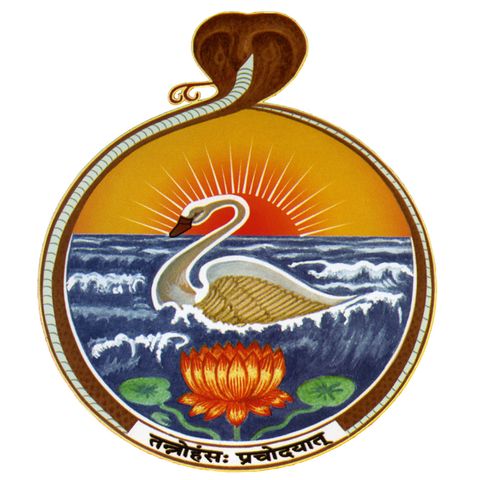Vivekachudamani 1 | Three Rare Divine Gifts: Human Birth, Longing for Freedom, and the Company of Great Souls | Swami Tattwamayananda
May 6, 2019 ·
1h 48m 29s

Download and listen anywhere
Download your favorite episodes and enjoy them, wherever you are! Sign up or log in now to access offline listening.
Description
Vivekachudamani Verses: 1-7, 11, 15, 18, 19 This lecture was given by Swami Tattwamayananda at Stanford University. The lecture was hosted by the Stanford Hindu Students Association. -Viveka means a...
show more
Vivekachudamani Verses: 1-7, 11, 15, 18, 19
This lecture was given by Swami Tattwamayananda at Stanford University. The lecture was hosted by the Stanford Hindu Students Association.
-Viveka means a discerning wisdom between the long lasting and real versus the short-lived and unreal. It is a reprioritization towards the beneficial and long lasting.
-Shankaracharya, the author of the text, may be one of the greatest geniuses the world has ever produced. Before Sri Shankaracharya, the idea of Advaita or nondualistic philosophy existed because it is as old as Rig Veda itself, but the formulation of a complete and compact philosophical structure, expounding its metaphysics, ontology, cosmology, logic, and epistemology, was entirely his contribution.
-Vivekachudamani is a great introductory text because it teaches the philosophy and the culture of spiritual life in 584 verses.
-Shankaracharya’s teacher was Govinda Bhagavatpada.
-Human birth, longing for freedom, and the company of great souls are three rare gifts from God. A great soul is one whose company stimulates your desire for higher life.
-It is spiritual suicide to reject our own spiritual nature if we have been given all the advantages for the realization of our spiritual nature.
-Action and rituals are not wrong but they cannot, on their own lead to spiritual realization. They serve to purify the mind.
-The proof of a pure mind is unshakeable inner contentment, which is unrelated to any external circumstances (santosha or citta-prasada or citta-shuddhi)
-Epoch makers in spiritual life always get linked to an ancient tradition through a guru. The guru is necessary to understand the reality of the spiritual reality which is apparently invisible at the beginning.
-Viveka, a reprioritization towards the Real or unchanging (nitya) and away from the Unreal or fleeting (anitya) is the first of the four disciplines of Vedanta. It is foolish to imagine eternal happiness in the obviously imperfect world. Saints internalize this fact, conserve energy and are able to work with complete concentration and do tremendous work.
-Mumukshutvam, the yearning for truth and freedom supports all of the qualities needed for a Vedantic aspirant. Without a higher non-worldly ideal, psychological depression is almost certain.
-Sri Ramakrishna’s parable of the four kinds of fish is used to illustrate mumukshutvam.
show less
This lecture was given by Swami Tattwamayananda at Stanford University. The lecture was hosted by the Stanford Hindu Students Association.
-Viveka means a discerning wisdom between the long lasting and real versus the short-lived and unreal. It is a reprioritization towards the beneficial and long lasting.
-Shankaracharya, the author of the text, may be one of the greatest geniuses the world has ever produced. Before Sri Shankaracharya, the idea of Advaita or nondualistic philosophy existed because it is as old as Rig Veda itself, but the formulation of a complete and compact philosophical structure, expounding its metaphysics, ontology, cosmology, logic, and epistemology, was entirely his contribution.
-Vivekachudamani is a great introductory text because it teaches the philosophy and the culture of spiritual life in 584 verses.
-Shankaracharya’s teacher was Govinda Bhagavatpada.
-Human birth, longing for freedom, and the company of great souls are three rare gifts from God. A great soul is one whose company stimulates your desire for higher life.
-It is spiritual suicide to reject our own spiritual nature if we have been given all the advantages for the realization of our spiritual nature.
-Action and rituals are not wrong but they cannot, on their own lead to spiritual realization. They serve to purify the mind.
-The proof of a pure mind is unshakeable inner contentment, which is unrelated to any external circumstances (santosha or citta-prasada or citta-shuddhi)
-Epoch makers in spiritual life always get linked to an ancient tradition through a guru. The guru is necessary to understand the reality of the spiritual reality which is apparently invisible at the beginning.
-Viveka, a reprioritization towards the Real or unchanging (nitya) and away from the Unreal or fleeting (anitya) is the first of the four disciplines of Vedanta. It is foolish to imagine eternal happiness in the obviously imperfect world. Saints internalize this fact, conserve energy and are able to work with complete concentration and do tremendous work.
-Mumukshutvam, the yearning for truth and freedom supports all of the qualities needed for a Vedantic aspirant. Without a higher non-worldly ideal, psychological depression is almost certain.
-Sri Ramakrishna’s parable of the four kinds of fish is used to illustrate mumukshutvam.
Information
| Author | Vedanta Society, San Francisco |
| Organization | Vedanta Society, San Francisco |
| Website | - |
| Tags |
Copyright 2024 - Spreaker Inc. an iHeartMedia Company
